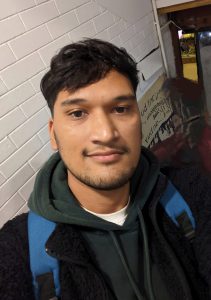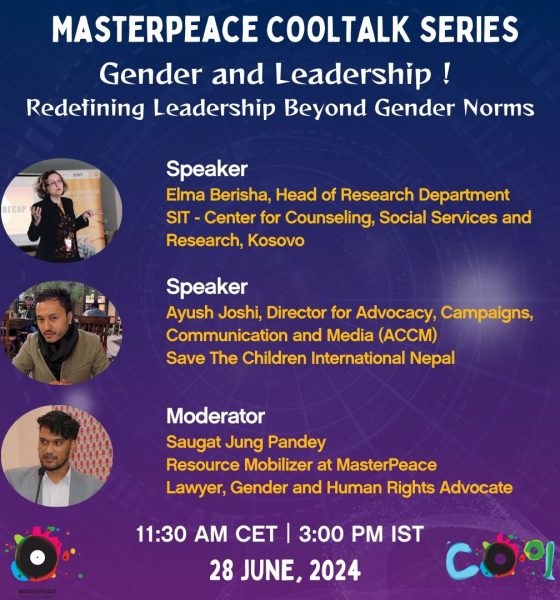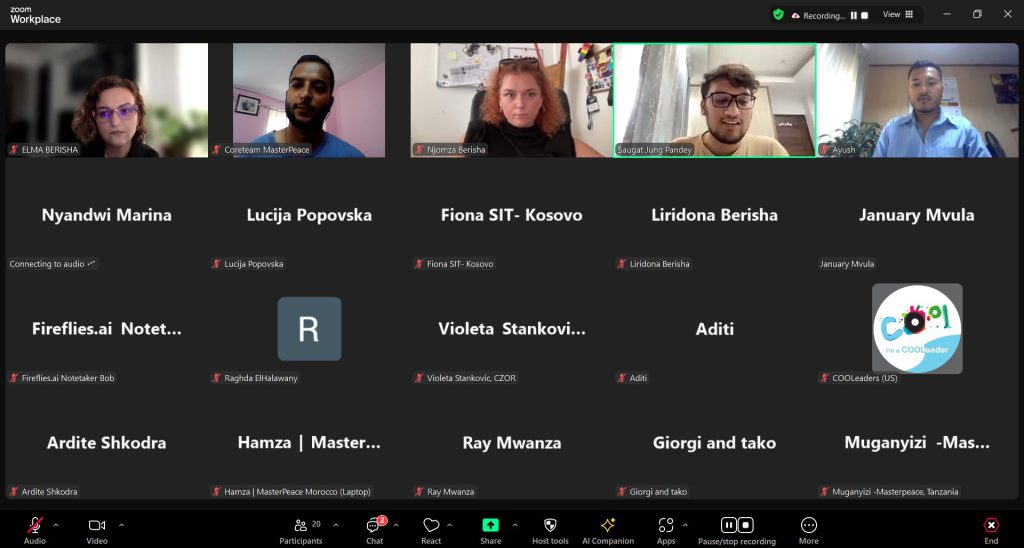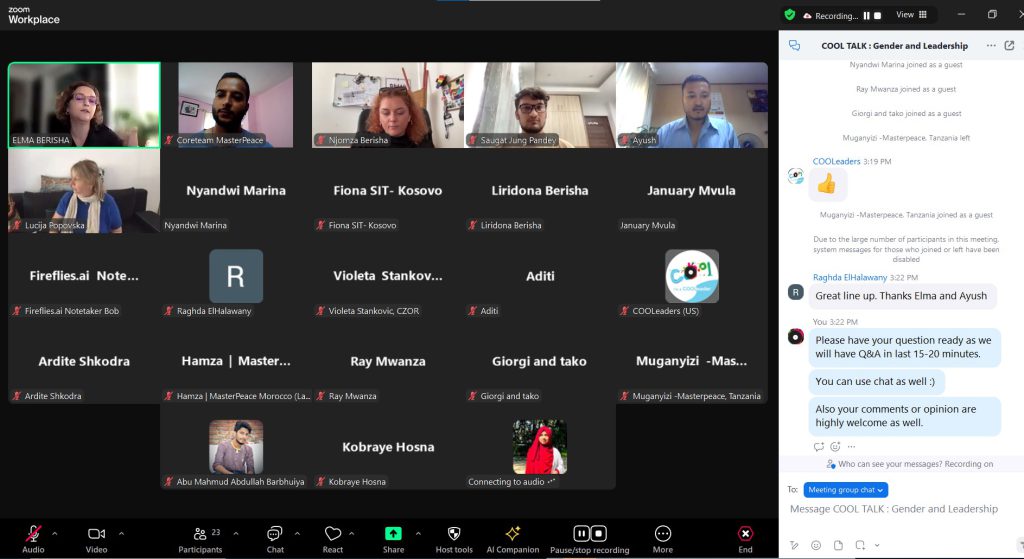MasterPeace COOL Talk Series: Redefining Leadership Beyond Gender Norms

Saugat Jung Pandey
Creative Resource Mobilizer
On 28 June 2024, MasterPeace conducted another COOLTalk as part of a series titled “Gender and Leadership: Redefining Leadership Beyond Gender Norms.” The event brought together 25 participants from different parts of the world, spanning four continents, reflecting a truly global perspective.
The two speakers for the series were Elma Berisha, Head of the Research Department at SIT-Center for Counseling, Social Service, and Research Kosovo, and Ayush Joshi, Director for Advocacy, Campaigns, Communication, and Media (ACCM) at Save the Children International Nepal. The session was moderated by the human rights advocate and Creative Resource Mobilizer (CRM) at MasterPeace, Saugat Jung Pandey.
The event started with an introduction by MasterPeace’s Creative Resource Mobilizer (CRM) Ashwini Dhakal, who provided an overview of the MasterPeace COOL Talk series and how the idea came about. He highlighted the diverse global participation and emphasized the representation of both the Global North and Global South among the speakers. This set the stage for the discussion on new leadership paradigms and the evolving role of women in leadership positions.

New Leadership Paradigm
The moderator started the discussion by posing a question about the new leadership paradigm and the increasing visibility of women in leadership roles. He mentioned that “leadership has no gender”. He cited examples of prominent women leaders in politics, such as Kamala Harris, and in the corporate world, such as those leading organizations like PepsiCo and General Motors.
Elma Berisha responded by describing leaders as agents of change and transformation. She shared how a trainer from Harvard University reshaped her concept of leadership and criticized historical examples of brutal leaders like Alexander the Great, Napoleon, and Caesar. She emphasized that the new leadership paradigm contrasts sharply with the old, which was hierarchical and fear-based.
She explained that modern leadership is about inspiring and empowering others, promoting egalitarianism, and fostering a cooperative and inclusive environment. Elma also noted the generational shift, with Gen Z and Gen Y more inclined towards diversity and inclusion rather than traditional leadership modes.
Challenges and Opportunities in the Global South
Ayush Joshi offered a perspective from the Global South, noting that patriarchy remains pervasive and shapes societal roles and expectations. He discussed the unconscious biases that influence leadership perceptions, citing examples from daily life where women’s decision-making is often overshadowed by male preferences. Ayush stressed the need to challenge these norms and biases to diversify leadership and recognize the capabilities of women and marginalized groups.
Gender Stereotypes and Social Norms
The moderator shifted the conversation towards gender stereotypes and social norms that limit women’s leadership opportunities. He also cited the World Economic Forum’s Gender Gap Report of 2023, which showed that the percentage of women in leadership is lower than that of men in every sector and, surprisingly, also lower in sectors traditionally considered to be women-dominated, such as healthcare, well-being, education, and NGO’s.
Elma highlighted the significant gender gap in leadership, with women making up almost 50% of the global workforce but only a quarter of leadership positions. She discussed unconscious gender biases and the importance of equal opportunities, emphasizing that women should be paid equally for the same work as their male counterparts. She also pointed out the dual influences of nature and nurture on gender roles and expectations.
Ayush, agreeing with Elma, added that gender stereotypes and norms hinder diverse leadership. He shared a story from Jajarkot, Nepal, which was recently struck by a 6.4 magnitude earthquake where a girl challenged a harmful norm related to menstruation where menstruating women were not allowed to touch cows or drink their milk as they were considered to be impure during that period. She challenged this norm and demonstrated leadership informed by knowledge and rational decision-making. Ayush argued that diversifying leadership requires addressing deep-seated societal norms and biases and that only when more women can be encouraged to take up leadership roles.


LGBTQ+ Leadership and Inclusion
The third question focused on LGBTQ+ leadership and the need for inclusive leadership. Elma connected this to the broader theme of diversity and inclusion, emphasizing that genuine leadership must embrace diversity for pragmatic gains, such as better innovation and financial performance. Ayush added that inclusive leadership should be continuous and intentional, not just limited to symbolic events like Pride Month.
Q&A
The session concluded with questions from the audience. One question addressed uplifting rural women’s leadership, to which Elma responded that cooperation and support from urban leadership are crucial for women in rural area to come forward. Similarly, another question focused on increasing knowledge on inclusion, particularly for the LGBTQIA+ community in the Global South. Ayush suggested starting with sensitization training to address biases at home and school. He also shared a success story of sensitizing teachers and school management in regard to LGBTIA+ issues.
Elma shared an inspiring story of her senior partner, Rinida Das Frost, who founded the Frost and Sullivan Malaysia office, demonstrating how role models can make a difference. She added that Frost, who was initially there in Malaysia with her husband to take off their child and be a housewife, later was bored with staying at home and wanted to do something about her career. That it when she started Frost and Sullivan Malaysia Office. Similarly, Ayush emphasized the importance of positive role modeling and empowering underrepresented communities to diversify and achieve inclusive leadership.
